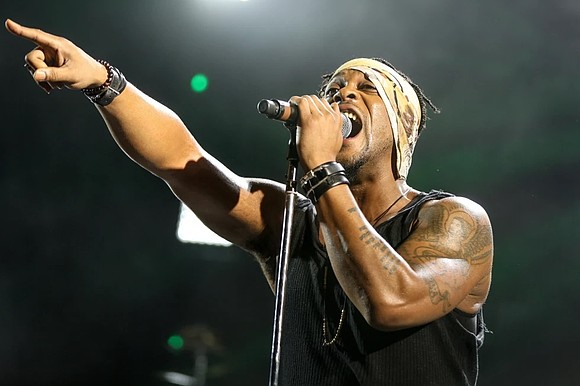D’Angelo, Grammy-winning R&B singer, dies
by Johnathan Landrum | 10/14/2025, 1:08 p.m. | Updated on 10/16/2025, 6 p.m.

Associated Press
D’Angelo, the Grammy-winning R&B singer recognized by his raspy yet smooth voice and for garnering mainstream attention with the shirtless “Untitled (How Does It Feel)” music video, has died. He was 51.
The Richmond native, who was born Michael Eugene Archer, died Tuesday after a long bout with cancer, his family said in a statement. It called him “a shining star of our family and has dimmed his light for us in this life,” adding that they are “eternally grateful for the legacy of extraordinarily moving music he leaves behind.”
In his music, D’Angelo blended hip-hop grit, emphatic soul and gospel-rooted emotion into a sound that helped spearhead the neo-soul movement of the 1990s. Earlier this year, the Virginia native celebrated the 30th anniversary of his debut studio album “Brown Sugar,” a platinum-selling offering that produced signature hits like “Lady” and the title track. The 1995 album earned him multiple Grammy nominations and cemented him as one of R&B’s most original new voices.
D’Angelo’s sultry vocal style — a mix of raspy texture and church-bred fluidity — set him apart from his peers. That voice became inseparable from the striking visuals of his 2000 single “Untitled (How Does It Feel).” The minimalist, shirtless music video became a cultural touchstone, igniting conversations around artistry, sexuality and vulnerability in Black male representation. The song earned him a Grammy for best male R&B vocal performance and propelled his sophomore album “Voodoo,” topping the Billboard 200 chart and winning the Grammy for best R&B album.
With an idiosyncratic spirit not unlike Prince, D’Angelo’s devotion was always to the craft — not the machinery around it. In a 2000 interview with The Associated Press, he spoke candidly about the cost of chasing commercial success.
“(Musicians) have gotten trapped into that mode of thinking marketable and commercial. That destroys art, that destroys the essence of what it is about,” he said. “You cannot, you cannot work like that. You cannot make music like that. That’s not what this is about.”
That same year, D’Angelo reflected on his need for solitude amid fame: “I used to hang out a lot, but now I’ve become more of a recluse,” he told AP. “I long for just peace and silence.”
Before he became an international star, D’Angelo’s Richmond roots played a crucial role in shaping his musical path. Richmond musician and educator Bill McGee first met Archer in 1988 at Festival Park, when McGee was managing a student R&B band as part of his work as John F. Kennedy High School’s band director. McGee remembers Archer showing musical skills that were evident from an early age.
“He was so impressive,” McGee said. “He was doing Prince, Michael Jackson, James Brown. He was dropping the mic and doing a split and picking it up. He had his own little band. He was 12 years old running his own band, like a young Prince.”
Impressed, McGee asked Archer’s mother if her son could perform in the school’s talent show. Archer went on to participate for five years in shows so popular that they moved to the Richmond Mosque, now known as the Altria Theater, to accommodate larger audiences. For years, McGee mentored Archer, who pursued music in part because of the talent shows and the older student competitors he faced.
 D’Angelo attends club performance at Area 51 of Dirty Souls, a rap duo formed by his cousins, in 1991. (Regina Boone/Richmond Free Press)
D’Angelo attends club performance at Area 51 of Dirty Souls, a rap duo formed by his cousins, in 1991. (Regina Boone/Richmond Free Press)
Beyond his own catalog, D’Angelo’s artistry shined in collaborations. He memorably duetted with Lauryn Hill on the soulful ballad “Nothing Even Matters,” a highlight of her landmark 1998 album “The Miseducation of Lauryn Hill.” He also contributed to The Roots’ 1996 album “Illadelph Halflife” and was part of the supergroup Black Men United, which yielded one song: “U Will Know,” which D’Angelo wrote and co-produced for the film “Jason’s Lyric” in 1994.
Years before stepping back from public view, D’Angelo’s life and music were closely intertwined with Grammy-nominated R&B singer Angie Stone in the ’90s. The pair met while he was finishing “Brown Sugar” and bonded over their shared Southern roots and deep church upbringing. Stone contributed to the album and later collaborated with him on “Everyday,” a song from her 1999 debut album, “Black Diamond.”
Stone described D’Angelo as her “musical soul mate” to the AP in 1999, adding that their working relationship was “like milk and cereal …. Musically, it was magic. It’s something that I have not been able to do with any other producer or musician.” They had a son together, the artist Swayvo Twain, born Michael Archer Jr.
Stone died earlier this year in a car crash. She was 63.
Free Press staff writer George Copeland Jr. contributed to this article.






